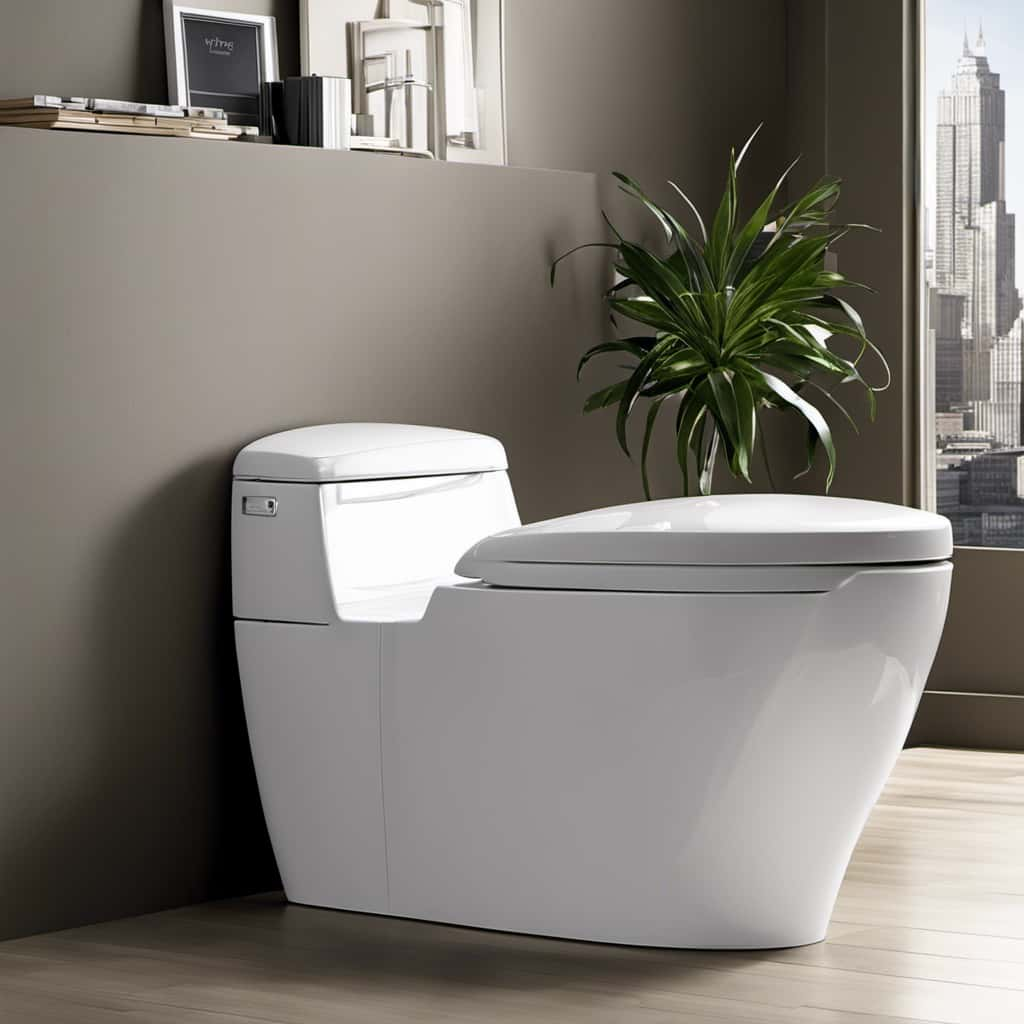Composting toilets are a sustainable alternative to traditional flushing systems because they turn human waste into compost right on-site, saving water and reducing environmental impact. They operate without water, eliminate reliance on centralized treatment plants, and prevent pollutants from contaminating groundwater. By managing waste locally, they lessen transportation needs and energy use. If you want to discover how these systems support eco-friendly living and conserve resources, there’s more to learn ahead.
Key Takeaways
- Composting toilets convert human waste into nutrient-rich compost without water or chemicals.
- They reduce water usage significantly compared to traditional flushing toilets.
- Operating locally, they minimize waste transport, lowering environmental impact.
- They prevent groundwater contamination and reduce sewage overflow risks.
- They support sustainable resource cycles by recycling nutrients back into the soil.

Composting toilets offer an eco-friendly alternative to traditional sewage systems by transforming human waste into compost through natural decomposition. This method markedly influences waste management practices by reducing reliance on centralized wastewater treatment plants and minimizing the need for extensive piping and infrastructure. Instead of sending waste through complex sewer networks, you manage it on-site, turning what would normally be considered waste into a valuable resource. This approach not only simplifies waste handling but also promotes a more sustainable cycle, decreasing the burden on municipal systems and conserving resources.
When it comes to environmental impact, composting toilets shine as a green solution. They eliminate the need for water-heavy flushing processes, which are responsible for a considerable portion of freshwater consumption worldwide. By operating without water, these toilets help conserve precious resources, making them ideal for remote locations, off-grid homes, or eco-conscious communities. Additionally, because they avoid the use of chemicals like chlorine or other disinfectants, composting toilets prevent the release of harmful substances into the environment, supporting healthier ecosystems. The compost produced can be safely used as a fertilizer, closing the loop and returning nutrients to the soil, which further reduces the environmental footprint.
You’ll find that composting toilets also contribute to waste management by reducing the volume of waste that needs to be transported or processed at treatment facilities. Instead of hauling waste through trucks, which consumes fuel and produces emissions, you handle waste locally. This localized management diminishes greenhouse gas emissions and lessens the overall environmental impact. Properly maintained composting toilets also limit the potential for groundwater contamination, a common concern with traditional septic systems and sewage overflows. They prevent dangerous pathogens from leaching into water sources, helping protect public health and water quality. Additionally, integrating advanced AI security technologies can enhance monitoring and ensure safe operation of these systems.
Moreover, composting toilets foster sustainability by encouraging responsible waste disposal. You actively participate in the process, understanding how waste is transformed into a useful resource. This awareness can inspire more environmentally conscious behaviors and promote community-wide efforts to reduce ecological footprints. Overall, these toilets provide a practical, eco-friendly alternative that enhances waste management efficiency while considerably lowering environmental impact. They are especially valuable in areas where traditional infrastructure is impractical or unavailable, offering a simple yet effective way to manage human waste sustainably. By choosing composting toilets, you contribute to a healthier planet, conserving water, reducing pollution, and supporting resource recovery—all essential steps toward a more sustainable future.

OGO Origin Composting Toilet – 12V Electric Agitator, Urine Diverting RV Toilet for Van Life, Tiny Home & Boat – 15" Compact, Odorless Off-Grid Toilet, No Black Tank
SMALLEST FOOTPRINT FOR TIGHT BUILDS (15"x16") Designed for Sprinter/Transit vans, tiny homes & boats where space is everything….
As an affiliate, we earn on qualifying purchases.
As an affiliate, we earn on qualifying purchases.
Frequently Asked Questions
How Long Does Composted Waste Take to Become Usable Fertilizer?
Composted waste typically takes about 6 months to a year to become usable fertilizer, depending on conditions like moisture, temperature, and aeration. During this time, it reaches compost maturity, where soil nutrients are balanced, and pathogens are eliminated. You’ll know it’s ready when it has a dark, crumbly texture and earthy smell. Properly composted waste provides rich soil nutrients, making it a sustainable and safe fertilizer for your garden.
Are Composting Toilets Suitable for Large Families or High-Traffic Areas?
Composting toilets can handle large families or high-traffic areas if you choose models with higher toilet capacity and sufficient family capacity. You need to guarantee the system is designed for frequent use, with enough composting chambers and proper ventilation. Regular maintenance and monitoring are essential to prevent odors and ensure efficient composting. When set up correctly, composting toilets are a practical, eco-friendly option for busy households or communal spaces.
What Maintenance Is Required to Keep a Composting Toilet Odor-Free?
To keep your composting toilet odor-free, you need to prioritize ventilation maintenance and odor control. Regularly check that the ventilation system is working properly to ensure proper airflow, which helps eliminate odors. Add carbon-rich materials like sawdust or coconut coir after each use to absorb moisture and odors. Also, empty or manage the compost at recommended intervals and consider using odor-neutralizing products to sustain a fresh, odor-free environment.
Can Composting Toilets Be Installed Indoors Without Ventilation Systems?
Did you know that over 30% of indoor air pollution can come from inadequate ventilation? Yes, you can install composting toilets indoors without a dedicated ventilation system, but proper indoor ventilation and space requirements are essential. Make certain of good airflow to minimize odors and moisture buildup. Position the toilet in a well-ventilated area, and consider using an exhaust fan or air exchange system for maximum odor control and air quality.
Is There Any Health Risk Associated With Handling Composted Human Waste?
Handling composted human waste generally poses minimal health risks if you follow proper health safety practices. You should wear gloves and wash your hands thoroughly afterward to prevent pathogen risks. Composting, when done correctly, reduces harmful bacteria and pathogens considerably. Avoid direct contact with the compost, and ensure it’s fully processed before use. Proper maintenance and hygiene are key to keeping health safety intact while managing composted waste.

Cuddy Composting Toilet – Odorless, Waterless & Self-Contained. Perfect for Vans, Boats, RVs, Cabins & Living Off-Grid. 3.9 Gal Capacity, Easy to Clean, No Chemicals, 12V Fan, Internal Carbon Filter
Built for RVs, Vans, Boats & Tiny Spaces – Compact and easy to install, Cuddy fits flush or…
As an affiliate, we earn on qualifying purchases.
As an affiliate, we earn on qualifying purchases.
Conclusion
Imagine standing in a lush garden, where your waste transforms into rich, nourishing soil. Composting toilets turn your bathroom routine into a sustainable act, closing the loop between waste and growth. With each use, you become a steward of the Earth, reducing water waste and nurturing life. Embrace this eco-friendly choice and feel the satisfaction of contributing to a greener, healthier planet—one composting toilet at a time.

LEIFIDE Composting Toilet Kit All Natural No Chemicals Composting Sawdust 4.4 Pounds and 8 Gallon Biodegradable Bags for Indoor & Outdoor Organic Compost Toilets, No More Odor
No More Odor in Portable Composting Toilets: highly absorbent natural sawdust quickly locks in moisture and unpleasant smells,…
As an affiliate, we earn on qualifying purchases.
As an affiliate, we earn on qualifying purchases.

Kohree Portable RV Toilet, Camping Toilet Porta Potty, 5.8 Gallon Detachable Waste Tank, Indoor Outdoor Leak-Proof Toilet with Level Indicator, for Adults Home Use, RV Travel, Boat and Trips
EASY TO CARRY & HOLDS 440LB/200KG: Kohree portable toilet with OVERALL DIMENSIONS of 14.4"(L) x 16.3" (W) x…
As an affiliate, we earn on qualifying purchases.
As an affiliate, we earn on qualifying purchases.









